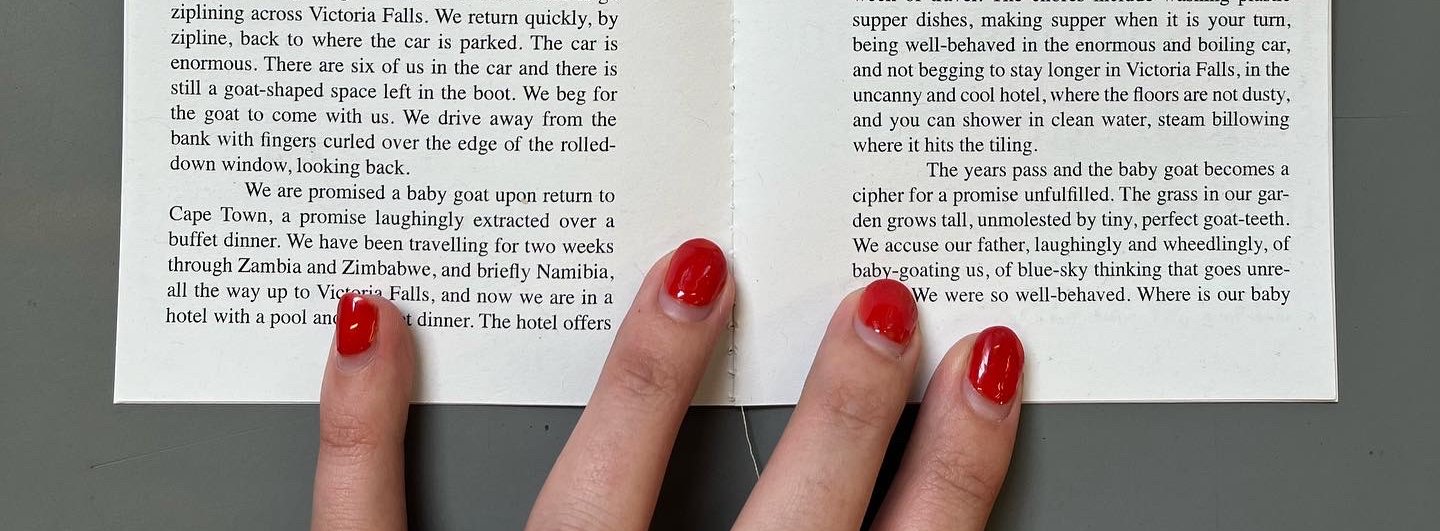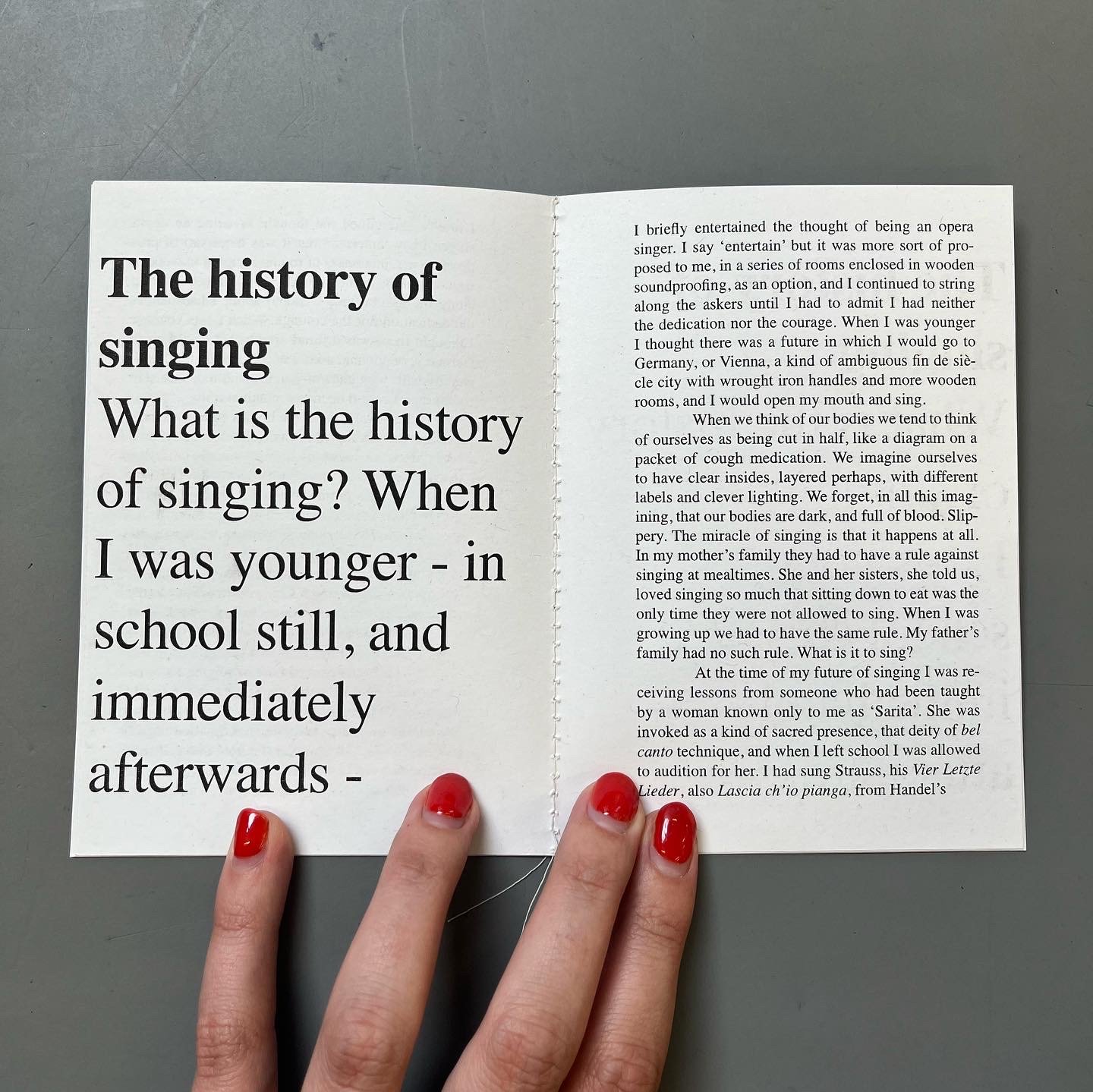
Key details
Date
- 11 September 2023
Read time
- 4 minutes
At the RCA Margot Dower has written about drapery, textiles and tactility and learnt to take her writing seriously through the support of the MA Writing programme and her peers.
Key details
Date
- 11 September 2023
Read time
- 4 minutes
Margot Dower is from Cape Town, South Africa, where she studied printmaking and art history. She came to the RCA to develop her writing by considering it as a creative practice in its own right, curious as to how this repositioning might transform her writing as well as her perspective on the things she was studying.

What did you come into the MA Writing programme wanting to do?
I wanted to write beyond art history – to think about things like dresses or cooking as being equally important and deserving of serious consideration. And I wanted the shape that my consideration took to change, to become more flexible, slanted, sideways. I received lots of support from the staff on the programme as well as my peers in the form of crits, tutorials, and talking to each other before, during and after class.
What did you write about on the programme?
I mostly wrote about clothing and textiles, which surprised me – I didn’t think I would have such a clear line of inquiry when I began the course, but it was interesting to see it develop organically throughout the year.
My IRP [Independent Research Project], Tacking Stitches, is a long piece of writing about drapery, textiles, tactility and intuition. It is also about art and clothing, and about describing the places where they touch: in the pleats of a sculpture and the pleats of a dress, in the structures that hold things up, in the drop of cloth as it falls to the floor. It is about moving countries and the practices that will hold you when you get there.
I also wrote about mending, luxury fashion, workwear and the history of the workers’ smock during my time on the programme. And I was always working on other things, written or otherwise – writing tends to spill over into the rest of my life.

How would you sum up your creative process in one sentence?
I spend a lot of time walking around Peckham Rye and frowning visibly and then I go to the library and I trick myself into writing something – sometimes I have to start writing something else and then it changes shape – and then I stare at it and rework it for a long time until it makes sense.
What’s been your most memorable moment at the RCA?
We went on a class trip to Glasgow quite early on in the programme and it was excellent, a perfect mixture of really interesting and really surreal. It was lovely walking all over the city and speaking to different people and I loved being able to spend four days with my classmates traipsing from place to place.
How has being at the RCA changed you, or your practice?
The RCA – and the Writing programme specifically – has taught me to take my writing seriously. That sounds like a non-starter but it’s true: it’s been really eye-opening to consider not just the contents of a piece of text but the way in which it is delivered as a practice. I approach writing and texts now in a different way: more rigid, but also more open to what might happen.
I’ve also made a book of my writing, Slim Pickings, which has made me realise you can just make things – you don’t always have to wait for someone to make them for you, or even with you.

What opportunities have you had to share and get feedback on your work?
The MA Writing has crits built into its structure, and these crits are majorly peer-delivered, rather than being a more traditional art school-style of crit, where your tutor delivers feedback in front of a class. Each person is assigned to read and lead discussions of at least three other peoples’ work, and this means that the most important critical voice is always your peers’. The programme also encourages sharing work individually on an ongoing basis, and I’ve enjoyed developing editor/reader relationships with my friends from the course.
Have you had the opportunity to collaborate or work with students from other programmes or disciplines?
Yes, in both the Urgency of the Arts module and AcrossRCA, the School-wide and College-wide units respectively. I’ve also really valued technical access to workshops despite the fact that my programme doesn’t necessarily have a technical component: I’ve been able to print risographs and letterpress, two techniques my undergraduate degree didn’t offer. This is really important to me as a printmaker, and has allowed me to make books of my writing, and learn more about the practical aspects of making writing physical.

How have you found studying in London for the first time?
I’ve loved it – I’ve found it to be a really exciting place, and the adjustment has been much easier than I could ever have anticipated. I wouldn’t have moved to London if I wasn’t doing my MA here, and I’m glad I am. I like living somewhere where things are happening all the time – openings, launches, readings, events. I think moving to a new country is really difficult and I’m glad I don’t have to leave the city I moved to because my degree is ending: there is more than enough opportunity to work in my field here, and to do so for a long time.
What’s the most inspiring place in London for you?
I am a Peckham Rye devotée. I am obsessed with walking around it in a big circle. I also love the letterpress workshop at the Kensington Campus, where I have spent afternoons arranging type carefully and printing it under the watchful eye of Ian Gabb. And I love the V&A, which is so good (and so easy) to get lost in.
What do you have planned for your time post-RCA?
I am working at Bold Tendencies this summer, the not-for-profit arts organisation based in the Peckham Multi-Storey Car Park in South London, which is very local to where I live, and I am enormously enjoying not commuting into central London. I am also trying to spend as much time as I can lying down in the sun and looking for full-time employment in non-profit arts from September – and I am writing, of course, for artists and for myself, towards another small book of writing.

